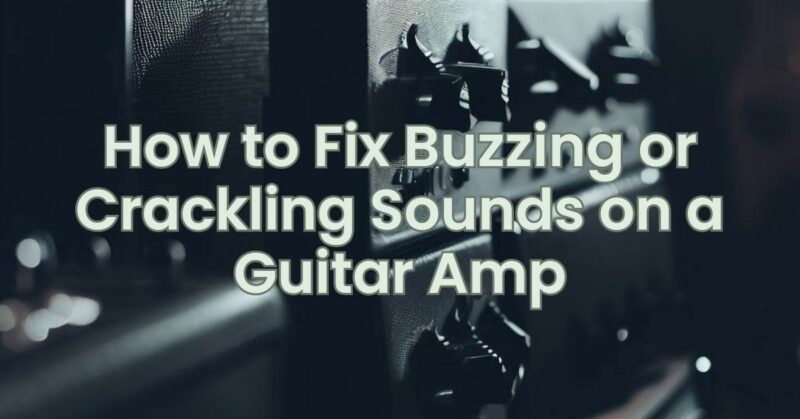As a guitarist, encountering buzzing or crackling sounds from your guitar amp can be frustrating and hinder your playing experience. However, many common issues that cause these undesirable noises can be resolved with a little troubleshooting. In this article, we will provide a step-by-step guide to help you diagnose and fix common issues with your guitar amp.
- Check the Cables and Connections: Start by inspecting all the cables and connections between your guitar, pedals, and amp. Ensure that the cables are securely plugged in and free from damage. Sometimes, loose connections or faulty cables can cause buzzing or crackling sounds. Try swapping out the cables or wiggling the connectors to identify any potential issues.
- Clean the Potentiometers: Crackling or scratchy sounds can often occur when the potentiometers (volume, tone, gain) become dirty or oxidized. To clean them, use a contact cleaner specifically designed for electronics. Apply a small amount of cleaner to the potentiometer’s base and work it back and forth while rotating the knob. This can help remove any debris or oxidation and restore smooth operation.
- Examine the Tubes (for Tube Amps): If you have a tube amp, faulty or worn-out tubes can cause buzzing or crackling sounds. Turn off the amp, allow it to cool down, and then carefully inspect the tubes. Look for signs of discoloration, glowing excessively, or a tube that doesn’t light up at all. If you notice any abnormalities, it’s advisable to replace the affected tube(s) with new ones that match the manufacturer’s specifications.
- Clean the Input Jack: Over time, the input jack on your amp can accumulate dust, debris, or oxidation, resulting in poor connectivity and crackling sounds. Use a contact cleaner or compressed air to clean the input jack. Insert and remove a cable several times to help remove any residue or oxidation.
- Adjust the Grounding: Improper grounding can cause a buzzing or hum in your amp. Ensure that your amp is properly grounded by using a three-pronged power cable and plugging it into a grounded power outlet. If the issue persists, try using a ground loop isolator or consult a qualified technician to address the grounding problem.
- Test Different Power Outlets: Sometimes, electrical interference from other devices or power outlets can introduce buzzing or crackling sounds. Try plugging your amp into a different power outlet to see if the issue persists. Ideally, use a dedicated outlet or one that is not shared with other high-powered electronics.
- Eliminate Radio Frequency Interference: External sources, such as cell phones, Wi-Fi routers, or fluorescent lights, can cause interference with your guitar amp, leading to unwanted noise. Move your amp away from these potential sources of interference or try using shielded cables to minimize the impact.
- Consult a Professional: If you have exhausted all troubleshooting steps and the issue still persists, it may be time to consult a qualified technician or guitar amp repair specialist. They have the expertise and tools to diagnose and fix more complex issues that may require component replacement or repair.
Buzzing or crackling sounds from a guitar amp can be frustrating, but with the right troubleshooting steps, many common issues can be resolved. By checking cables and connections, cleaning potentiometers, examining tubes (for tube amps), adjusting grounding, testing different power outlets, and eliminating interference, you can often identify and fix the source of the problem. However, if the issue persists or if you’re uncomfortable performing the repairs yourself, it’s always best to seek professional assistance. Proper maintenance and periodic inspections can also help prevent these issues and ensure that your guitar amp continues to deliver the desired sound for your playing enjoyment.


